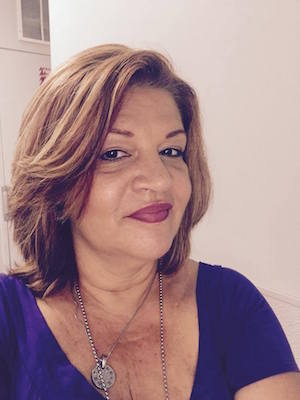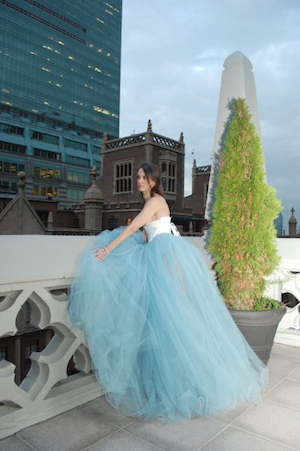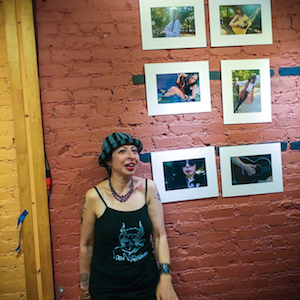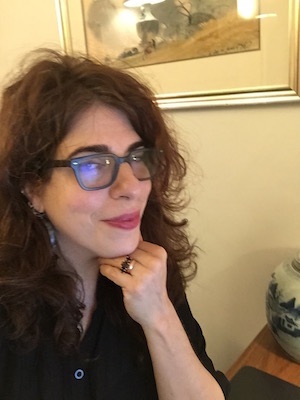
BY PUMA PERL | I was 21 years old and four months pregnant with my first child the day I found a lump in my breast. I didn’t tell anyone but the baby’s father. My family didn’t even know I was pregnant. I went alone to the prenatal clinic and was immediately referred to the breast clinic. I was terrified. My favorite aunt had been diagnosed with breast cancer when she was in her second trimester. She delayed treatment and gave birth to a healthy boy, but the cancer had advanced; she died when he was about eight weeks old. The details are hazy because I was only nine. She had been the only one to make me feel special and I grieved alone for a year, as children often do. The specifics of my own experience are a little hazy, too. Several tests and exams confirmed that the lump was just a swollen gland, nothing to worry about.
I was lucky. I was also lucky that none of my irregular mammograms, or the follow-up sonograms, revealed anything but dense tissue. As I write, I’m reminded that I am overdue by several months. The aunt who passed away was not a blood relative, but two of my mother’s sisters had breast cancer. When the doctor suggested I come twice yearly because of my family history, I sputtered inanely, But I have lots of aunts. It’s only two of them. But they were in their 80s when they were diagnosed. As many “buts” as I could muster.
Recalling my reactions, I think about our culture and the ways our breasts define us at different stages of our lives. About how the girls who developed early were called ho’s in my Brooklyn neighborhood. About how the tall, willowy, flat-chested girl was taunted and called “Nanook of the North.” About boys snapping my bra strap. About having “great tits,” and how it would feel to lose them. And I think about my friends: artists, poets, rock and roll girls. Could I be as brave as they are?
The artist known as “Star Angel” is one of those warriors. “Call me Esther Pagan, my real name,” she responded, when I asked how to represent her. “I want the world to know who I am. No more hiding. My cocoon shell dried up.” Esther is a licensed massage therapist and, as an independent contractor, found herself uninsured for several years.
“I found out about my cancer by accident,” she said. “I was sharing my concerns about my cardiac history with a friend, and she helped me obtain insurance. I went back to a doctor I’d seen for many years and had a full exam, including a mammogram. The office realized belatedly that they didn’t accept my insurance. He sent a bill for $3,000. On September 17, 2012, he called, told me I had breast cancer, and wished me good luck. I felt devastated, hurt, and angry, but I am a strong person and I started writing poetry and channeling my feelings into becoming an advocate through my voice and my art. From the minute I found out, I wrote, painted, sculpted, made art with anything I could get my hands on. With my art, I heal myself and educate others. I would love to travel with my one-woman show. Four of the pieces show the various stages of my reconstruction; I photographed each stage and wrote a poem about each experience.”
Esther sought treatment at the Mount Sinai Dubin Breast Center and underwent a double mastectomy a month later. “October 17,” she recalled, “right in the middle of National Breast Cancer Awareness Month. My experience has become my avocation and inspiration. My adversity was not only with breast cancer, but also with medical insurance, the way that I was informed, and my rejections when I applied for aid from non-profit foundations. Our community needs these issues addressed with compassion and effort, and especially for the survival of women of color, who have the greatest difficulties accessing care.”

Another artist whose healing process included the arts is Ronnie Norpel. She is also an actress, writer, and teacher. Recently, we talked about the night in 2009, when she informed several of us that she’d be “going under the knife” in two weeks. “I want you to know because you’re my friends,” she said. Laughing, she’d pointed to her chest and added, “I don’t have that much to lose, anyway. Don’t worry. I’ll be fine.” I asked her how she’d been able to maintain her upbeat attitude. “I guess I’ve always used humor to cope,” she replied. “I firmly believe that my hope and positivity carried me through. I’d discovered a pea-size lump the day before I was due for a routine check-up. I was so fortunate that it was caught in the early stages, and that I had great doctors. Women today have greater chances than in the past due to the diagnostic tools that are now available.”
Prior to her surgery, she did a “good-bye shoot” on a rooftop between the United Nations and the Chrysler Building, and later was the subject of the Deconstructing Icons project, which documented her journey via photographs. “I am so grateful that I escaped; that I’m still here,” she said. “I was given the chance to examine my philosophies, and I knew I wasn’t ready to go. This has been a lesson in grace.”
Following her surgery, Ronnie’s doctors suggested she attend a panel discussion. One of the speakers was Zoe Stark. “She had a cool vibe, and she was so matter of fact and informative. I felt connected to her,” Ronnie recalled. Zoe was a 45-year-old single mother of 13-year-old twins when she was diagnosed in June of 2007. She underwent 11 surgeries between June and October when she decided, with her doctors, that a double mastectomy would be best, since it was an extremely rapidly moving cancer.
“I was lucky,” she told me. “I had good insurance, excellent doctors, and amazing friends and co-workers who supported me.” She did not tell her kids or mother until the final surgery was planned. “I was scared, but I always believed I’d be okay, and I made an early decision to be open about it. I wanted to remove the stigma. The final surgery is very difficult, but I was empowered by it. I took control, and I didn’t allow society to inform my choices. I saved my own life, and by doing that I began to own my womanhood and my sexuality more than ever before.”
Her surgeons were so impressed by her positive attitude, that, following her reconstruction surgery, they asked her to talk to a patient who was having trouble with treatment decisions. Over the next three years, she mentored a number of women, sharing her story and giving them information about what to expect at each stage of the process. “I answered the questions that they rarely ask doctors. Like what about sex? What about new relationships? The stuff women really want to know. I’m still in touch with a few of the women. I don’t use the word ‘survivor.’ I hate that word. It doesn’t define me. I was given some stuff to deal with, and I dealt with it. Some people have it so much worse. I don’t care who knows. This is how we destigmatize.”

Alice Espinosa-Cincotta had kept her 2007 diagnosis, “hush-hush,” as she put it, confiding only in her husband, brother, a few close friends, and, by necessity, her supervisors at work. Over the last few years, she’s slowly begun to share with people in her circle. One of them was Zoe Stark. “We looked at each other in recognition and immediately went to the bathroom to compare notes. It’s a bonding experience when you share with other women who have been through it,” Espinosa-Cincotta noted. She was 43 years old and had just started a new job; she’d also won a CUNY scholarship to begin graduate studies. Like Esther, she’d been without health insurance for a period of time and had not had a mammogram for two years. “I think I found myself on the floor when I was given the news. My first question to the doctor was, ‘How much time do I have?’ ”
The doctor assured Espinosa-Cincotta that she was in the early stages, and a good candidate for successful treatment. She opted for partial mastectomies, followed by rounds of chemotherapy, radiation, and Herceptin. “They suggested that I stop working because of the side effects,” she said, “but I was rebellious. Even though I was scared, I was determined to keep living a normal life, going to work, going to school, acting ‘as if.’ This is how I cope; I act like everything is all right. In a way, I numbed myself. I didn’t want pity. When my hair fell out, I bought a cute little wig and cut it like my hairstyle so nobody knew. I even got compliments on it!”

Determined to live as normally as possible, she said nothing to her co-workers, and her supervisors helped her schedule her shifts around the chemotherapy sessions. “I learned that I was a lot stronger and more capable than I thought. I earned A’s in all my coursework. Working with the disabled population is hard, but I did it. The longer you stay cancer-free, the better the chances that you’ll stay that way. I hadn’t been vocal about my experience, but now I feel ready to help others by showing that I’m living my life and they can, too. If I had the strength to beat the sickness, I have the strength to beat the stigma.”
Esther Pagan continues to create art and educate others. She recently co-hosted a gala in the Bronx and on October 16, she plans to participate in Making Strides in the Bronx, a fundraising walk along Orchard Beach.
Ronnie Norpel is still pursuing her careers as an actress, writer, photographer, and performer. She is working on a new memoir, “Boob Job From God,” a follow-up to “Baseball Karma and the Constitution Blues,” released in 2010. She hosts a monthly performance series at The West End Lounge (955 West End Ave.), and, on October 11, produced the Pink Princess Edition in recognition of National Breast Cancer month.
Zoe Stark, in the last several years, has fallen in love, gotten married on the Brooklyn Bridge, made several career changes, and, in her spare time, books bands and promotes rock shows.
Alice Espinosa-Cincotta works at the same job and has discovered a love for photography and videography. She participated in her first group show in August 2016, and takes courses at PhotoManhattan.
And me, I finally picked up the phone to make that overdue appointment. Maybe some of our readers will, too.
Visit nychealthandhospitals.org for info on low-cost and free mammograms. Keep up with Ronnie Norpel’s work at adlibpub.com/gigs.html. For info about Esther Pagan (Star Angel), facebook.com/star.angel.77377?fref=ts. Alice Espinosa-Cincotta: facebook.com/alice.espinosacincotta?ref=br_rs and instagram.com/alicealleycat/. Zoe Stark: facebook.com/zoe.stark.58. Puma Perl: facebook.com/pumaperlandfriends.



































